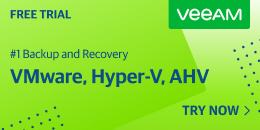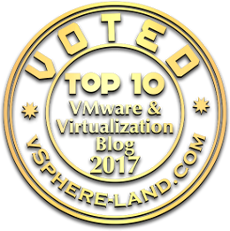I wanted to download the new vSphere virtual Management Assistant (replaced VIMA) and the vSphere CLI (replaced RCLI) to play around with them today and I spent at least 5 minutes trying to find them on VMware’s download site. The previous VI3 versions were available under the VI3 Downloads page on the Drivers & Tools tab but on the vSphere Downloads page the Drivers & Tools tab only has a network driver download listed. Eventually I figured out there were located under the Datacenter Downloads page as a separate product under the VMware SDKs & APIs Downloads page. So if you’re looking for them in the vSphere Downloads page you’re in the wrong spot as VMware has moved them to the their developer download area. You can also easily get to all the vSphere downloads from my vSphere download links page. Additionally you can quickly access all the documentation links from my vSphere documentation links page.
Jun 15 2009
Here’s your chance to pick the top VMware blogs
I have a hard time picking the top blogs from the many great ones that are out there. I initially started with a top 10 and recently expanded it to the top 20 as more and more blogs have started. In this post I outline my blog selection criteria for the top 20 and it’s no easy task for me to pick them and rate them in order. Well here’s the chance for you to pick the top 5 of my top 20 blog list using this new survey form that I created. You can pick from the current top 20 which you can see on my vLaunchpad,or choose other and add one that is not on the list. The survey will be open for 2 weeks, afterwords I’ll announce the results and update my vLaunchpad accordingly. Duncan Epping from http://yellow-bricks.com has been the reigning number #1 for a while now and is a tough one to beat. So head on over to my survey and cast your vote, each position will have a weight assigned with it and they will be added up accordingly for the final results.
Jun 09 2009
Is your server hardware capable of running vSphere?
With VI3 you could run on either 32-bit or 64-bit server hardware but vSphere requires 64-bit hardware because the VMkernel and Service Console are now 64-bit. I did a tip a while ago for searchvmware.com that talks about this in detail and shows how you can test your hardware to see if the CPU supports 64-bit and has some of the other CPU features that vSphere needs for certain features. To briefly summarize that tip:
- Long mode is required to be able to install vSphere, it will not install without it.
- To be able to run 64-bit VM’s on vSphere either the AMD-V or Intel-VT feature is required. Without it you can still run vSphere but are limited to using 32-bit VM’s.
- For the Fault Tolerance feature to work you need specific processors that support Lockstep technology, you can read this KB article to find out which ones have this feature.
Here are some links to various information that can help you better understand all this:
- VMware vSphere: Got 64-bit hardware?
- Processors and guest operating systems that support VMware Fault Tolerance (KB Article)
- VMware Fault Tolerance: What it is and how it works
- Lord of the virtual rings: Why hardware matters to your VMs
- An Introduction to 64-bit Computing and x86-64
- Understanding the Microprocessor
- Platforms and Tools for the AMD Athlon 64 Processor
- Hardware and firmware requirements for 64bit guest operating systems (KB Article)
- VMware and CPU Virtualization Technology
Jun 04 2009
Select VMworld sessions released for general public
About 2 months ago, John Troyer asked me for recommendations for 10 or so of some of the VMworld 2008 & VMworld Europe 2009 sessions to be released for free to non-attendees. It was hard picking just 10 and I ended up with about 30 of the ones I thought people would enjoy the most. Well it took a while but they just announced that they are now available for free and it’s almost the exact session list that I picked out back then. So head on over to the VMworld website and check them out, there is some great content there. You do need to have a VMworld account to view these sessions, if you don’t already have one you can get one by registering for free.
VMworld Europe 2009:
AP07 – Virtualized Oracle Database Server Performance and Best Practices
DC07 – What’s New in vCenter Server
DC14 – Overview of 2009 VMware datacenter products
DC15 – Hypervisor Competitive Differences: Beyond the Data Sheet
DC26 – vStorage – Storage integration for the VDC-OS
TA12 – Introducing VMware Converter 4.0: What’s New and Different
TA15 – Protecting your vCenter Server with Server Heartbeat
TA17 – End-to-End Disaster Recovery Approach with Automated SRM Failback
TA20 – Cisco Nexus 1000V Technical Preview
VMworld 2008:
AD2764 – Managing VMware with PowerShell
BC2215 – Top Tips for VMware Consolidated Backup
BC3141 – Understanding Options for Virtualized Disaster Recovery
EA2244 – Virtualizing SQL Server Using VMware Infrastructure
EA2263 – Deploying Exchange 2007 on VMware Infrastructure 3
EA2347 – Citrix Presentation Server Virtualization in VI3 – Best Practices
EA2538 – Using IBM WebSphere Family Products with VMware
EA2672 – VMware is the Best Platform for Java Workloads
PO1323 – Best Practices for Virtualizing Active Directory
PO1520 – Managing VMware ESXi in the Datacenter
PO2061 – VMware VirtualCenter 2.5 Database Best Practices
PO1944 – Architecting and Managing your Storage Effectively with Virtual Infrastructure
PO2218 – Everyday Usage of the RCLI
PO2841 – Virtualization – The Big Picture
TA1401 – Understanding Host and Guest Memory Usage and Other Memory Management Concepts
TA1405 – VMotion Technical Deep Dive
TA1440 – ESXtop for Advanced Users
TA2213 – VMware Infrastructure 3 Storage: iSCSI Implementation and Best Practices
TA2375 – Intepreting Performance Statistics in VI3
TA2550 – ESX Server Best Practices for Performance
TA2554 – VI Networking: Advanced Configurations and Troubleshooting
TA2668 – VMware ESX Architectural Directions
TA2920 – Overview of VMware Product Directions
TA3807 – VirtualCenter Directions
VD3261 – VDI versus Terminal Services
VI2389 – Licensing for a Virtual World
VI2940 – VMware ESXi: The Easiest Way to Get Started
VI2715 – Making the Case: Selling Virtualization When ROI isn’t Enough
LAB05 – VMware Infrastructure – Security Hardening & Best Practices (VMware VirtualCenter/ESX/ESXi)
LAB09 – Scripting VMware Infrastructure: Automating, Integrating, and Extending VI
Jun 01 2009
VMware Release/Build Info
I’ve just added a new section to this site under the vInfo tab called Release/Build Info which contains tables with the release dates/build numbers for each version of ESX, ESXi, Consolidated Backup, vCenter Server and Converter as well as links to download them and to the release notes. The tables cover ESX from 2.5 to 4.0, vCenter from 1.1 to 4.0, ESXi from 3.5 to 4.0, Consolidated Backup from 1.0 to 1.5 and Converter from 1.0 to 4.0.



